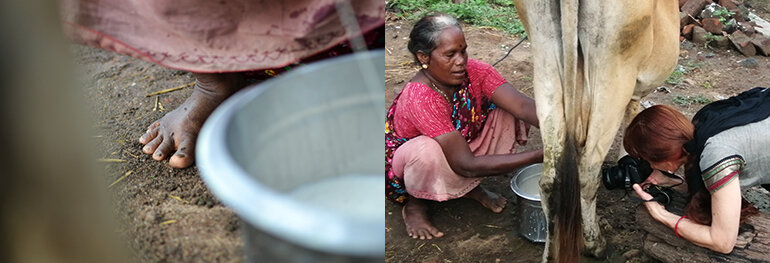This is a supplement to “At Dalits’ Feet: Archival Resources of Counteraction” by ANNA LAINE. Read the article here.
Photo: Anna Laine and Jeya Sharma
The article At Dalits’ Feet: Resources of Counteraction is based on participatory and collaborative ways of working. Knowledge has emerged during situated enactments in relation to photography, along with a camera during fieldwork and around printed images in a gallery setting.
How can participatory and collaborative ways of working be taught and learned?
A teacher’s transmission of a fixed formula could not evoke the required sensibilities and ethics. Instead, it is necessary to create an educational environment founded on participation, a space where the teacher as well as the students are participants. This enables knowledge to emerge along with the different experiences each participant brings with them. Through collaborative knowledge making, it holds the potential to take the participants beyond what they already know, in what Gert Biesta defines as “a process that transforms the outlook of all who takes part” (2013, 33).
According to Biesta, a virtuous teacher considers teaching as a gift, but is simultaneously aware that it only becomes a gift in the moment a student has opened up and received it as such. Moving along with Biesta, Tim Ingold suggests that educational participation meets participant observation in that the teacher, as well as the fieldworking anthropologist, needs to develop skills in attention and response in order to create these moments of receiving and transformation (2018).
The artist talk described in the article, led by Elilayan Jeyakumar and filmed by Ricardo Leizaola during the exhibition Transnational Proximities co-created with Sabes Sugunasabesan, developed into one such moment. Sitting on the mats with the photographs around us, sharing stories and experiences, all participants became infused with attentive and open-ended co-creation leading to transformation. We were being taught by each other, through an approach of participatory education that made us search for emancipation and growth rather than a final outcome.
References
Biesta, Gert J. J. 2013. The Beautiful Risk of Education. Boulder: Paradigm.
Ingold, Tim. 2018. Anthropology and/as Education. London: Routledge.
UPDATED JULY 5, 2020

